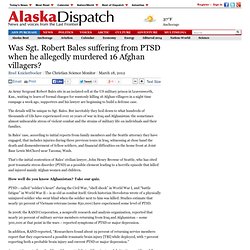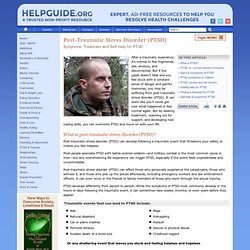

Was Sgt. Robert Bales suffering from PTSD when he allegedly murdered 16 Afghan villagers? As Army Sergeant Robert Bales sits in an isolated cell at the US military prison in Leavenworth, Kan., waiting to learn of formal charges for wantonly killing 16 Afghan villagers in a night time rampage a week ago, supporters and his lawyer are beginning to build a defense case.

The details will be unique to Sgt. Bales. But inevitably they boil down to what hundreds of thousands of GIs have experienced over 10 years of war in Iraq and Afghanistan: the sometimes almost unbearable stress of violent combat and the strains of military life on individuals and their families. In Bales’ case, according to initial reports from family members and the Seattle attorney they have engaged, that includes injuries during three previous tours in Iraq, witnessing at close hand the death and dismemberment of fellow soldiers, and financial difficulties on the home front at Joint Base Lewis McChord near Tacoma, Wash.
How well do you know Afghanistan? US Sen. Combat stress could be part of Afghan defense. The soldier accused of killing 16 civilians in Afghanistan faces military justice similar to a civilian criminal trial, a process likely to begin with a months-long mental health evaluation, a military legal expert says.

Although Staff Sgt. Robert Bales' lawyer has raised the issue of combat stress, it is rarely used as a defense in courts-martial because stress is commonplace in a military at war, says Philip Cave, a retired Navy lawyer who practices military law. Bales was being held in isolation Sunday at Fort Leavenworth in Kansas. The Army has found probable cause to hold him in the killing of 16 Afghan villagers. Bales' lawyer, John Henry Browne of Seattle, said Sunday that he expected to meet with Bales for the first time today.
Bales is also likely to be evaluated for his alcohol use and his treatment for traumatic brain injury related to a vehicle rollover while on deployment in Iraq, Cave said. Post-Traumatic Stress Disorder (PTSD) What is post-traumatic stress disorder, or PTSD?

PTSD is an anxiety disorder that some people get after seeing or living through a dangerous event. When in danger, it’s natural to feel afraid. This fear triggers many split-second changes in the body to prepare to defend against the danger or to avoid it. This “fight-or-flight” response is a healthy reaction meant to protect a person from harm. But in PTSD, this reaction is changed or damaged. Who gets PTSD? Anyone can get PTSD at any age. Not everyone with PTSD has been through a dangerous event. What are the symptoms of PTSD? PTSD can cause many symptoms. 1. Re-experiencing symptoms may cause problems in a person’s everyday routine. 2. Things that remind a person of the traumatic event can trigger avoidance symptoms. Post-Traumatic Stress Disorder (PTSD): Symptoms, Treatment and Self-Help.
What is post-traumatic stress disorder (PTSD)?

Post-traumatic stress disorder (PTSD) can develop following a traumatic event that threatens your safety or makes you feel helpless. Most people associate PTSD with battle-scarred soldiers—and military combat is the most common cause in men—but any overwhelming life experience can trigger PTSD, especially if the event feels unpredictable and uncontrollable.
Post-traumatic stress disorder (PTSD) can affect those who personally experience the catastrophe, those who witness it, and those who pick up the pieces afterwards, including emergency workers and law enforcement officers. It can even occur in the friends or family members of those who went through the actual trauma. PTSD develops differently from person to person. Traumatic events that can lead to PTSD include: The difference between PTSD and a normal response to trauma For most people, however, these symptoms are short-lived. A normal response to trauma becomes PTSD when you become stuck.